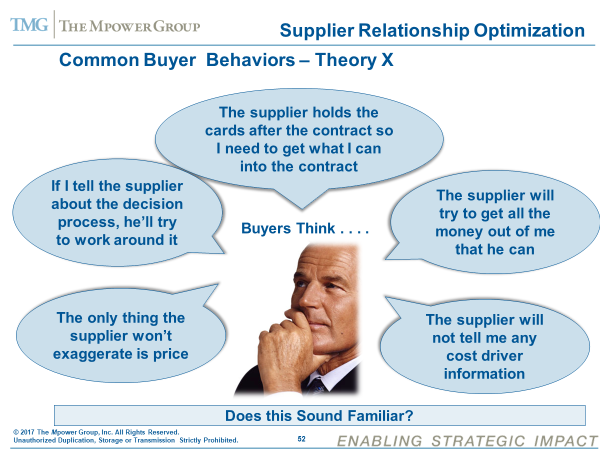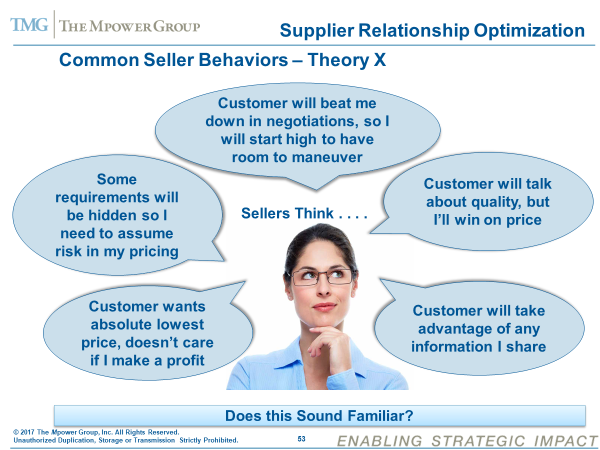Have you ever tried to manage a relationship? If the better half in your life thought you managed your relationship, how long do you think you’d be around? Yet we continue to insist on terms, disciplines and processes like Supplier Relationship Management and wonder why we don’t get the best from our suppliers or are not their “customer of choice”! And by the way, it’s the same with Stakeholder Management when we talk about internal relationships. Here is the definition of manage: be in charge of, administer, run, be head of, head, direct, control, preside over, lead, govern, rule, command, superintend, supervise, oversee, administer, organize, conduct, handle, or guide. Our perceptions drive our reality and if we believe we are to manage these relationships, it means we are making a set of assumptions that drive our behaviors which in turn drive the behaviors of the other side – external or internal. You may want to quickly look up Professor Ouichi’s seminal work on this related to organizational behavior which is relevant here as well (Theory Z).


While these may not be true for you, these are fairly common assumptions that we make and can be easily changed to describe the situation with internal relationships. This is why most of the SRM processes and tools are geared towards monitoring and control and have nothing to do with driving mutual value in the relationship. And when confronted with this phenomenon, suppliers behave and react accordingly.
Study after study has demonstrated that significant value is left on the table under this scenario yet we continue to do it. We invest a significant amount of time in defining what the relationship will look like (the contract) and then setting up processes and systems to manage the relationship. And almost all of our energy is focused on planning for the failure of the relationship in our prenuptial phase (what we will do to you if you don’t do what you are supposed to do or better known as SLAs). Our focus is singularly on what we want and need from the relationship. Try acting like that in your relationship with your significant other and see what happens ☹!
Try these 5 questions which are derived from a much longer assessment (if interested in the full version, let us know) on this topic and see how you fare.
- Are senior executives fully supportive of supplier relationship management skills as a core competency for all Global Procurement professionals?
- Are discussions with our Key Suppliers focused on mutual value creation, thus making us a “customer of choice”?
- Is supplier relationship management (SRM) is as important to our company as customer relationship management (CRM) which is demonstrated by a significant investment in the SRM function?
- Does Global Procurement strike an appropriate balance between time, effort and resources expended between the selection and contracting of Suppliers and the post-contract relationship management?
- Does the supplier relationship management process include a mutual feedback loop to drive continuous improvement of the relationship and ensures mutual goals continue to be met?
This will give you a quick view of where your organization sits in terms of your maturity level on this topic. Remember that the value derived from the relationship is the only value that increases over the length of the relationship – ALL other types of value (pricing, product, process etc. etc.) diminish over time. Yet, we continue to focus on the latter while ignoring the former.
I would argue that the role of a Relationship Optimizer (notice how I dropped manager there 🙂 ) is the most critical role that each one of us is required to play in our profession and yet it is one that is the most ignored and the one we are all woefully inadequately prepared to play. Just take a look at where most training dollars are being spent and you will quickly agree. Maximizing value through relationships (external and internal) is the key to our success as a function and it is high time that we acknowledge that and develop the tools, processes and most critically the competencies needed. We must focus on making the marriage successful (not having the best prenuptials in place) and even our prenuptials need to plan for success and not failure of the relationship. Join us at the next PERT workshop on October 3rd at the Morton Arboretum (Listle, IL) where we will spend the entire day on this topic.

